Welcome to the week. Here are the most noteworthy items the BikePortland community came across in the past seven days.
Black collegiate cycling team: Bike lovers at Saint Augustine’s University knew they wanted to form a cycling team; they didn’t know they’d become the first collegiate team from an HBCU.
Heidelberg’s approach gets NY Times treatment: This old German city with 1/6th the population of Portland has an enviable approach to sustainable transportation that elevates walking, transit and cycling and puts driving cars — even electric ones — far into the margins.
DOT and crash investigations: As Portland re-thinks the role of police in traffic safety and enforcement, it behooves us to watch how New York City activists approach the issue of moving crash investigations into the transportation department.
How to decrease driving: A new study from Transportation Research Board shows that the way to improve urban mobility and ensure the post-Covid era isn’t dominated by cars is to make the adoption of non-driving modes as seamless as possible.
Ped safety at SCOTUS: The US Supreme Courts is taking up a case about government’s responsibility to provide safe crossings for people on foot.
Advertisement
E-bike tax credits: Slate has a good overview of the federal push for e-bike tax credits.
Bike-friendly city profile: See how Fort Collins, Colorado used a People for Bikes grant to boost bicycling during the Covid pandemic.
Emission free delivery zones: Santa Monica wants to clear space and clear the air so they’re piloting emissions free delivery zones.
Follow of the Week: If you watch these @BikeLifeRex IG videos I think you’ll agree that calling himself “KING OF PHILLY” is spot-on.
Tweet of the Week: Not only did someone catch US DOT Secretary Pete Buttigieg riding home from work on a bike share bike, some people couldn’t resist bike-splaining him in the process.
Bike Twitter says my seat was too low. Can confirm. https://t.co/iEJ7L8if9Z
— Secretary Pete Buttigieg (@SecretaryPete) February 26, 2021
— Jonathan Maus: (503) 706-8804, @jonathan_maus on Twitter and jonathan@bikeportland.org
— Get our headlines delivered to your inbox.
— Support this independent community media outlet with a one-time contribution or monthly subscription.



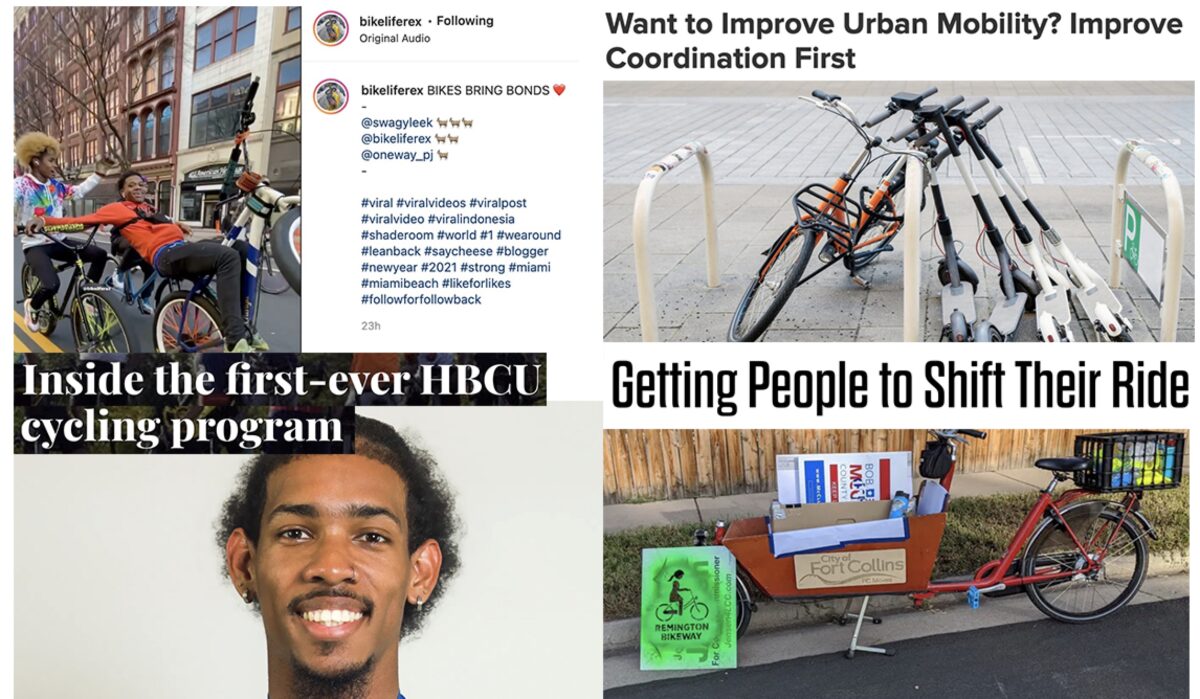
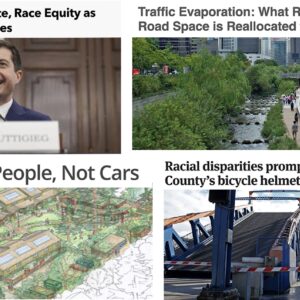
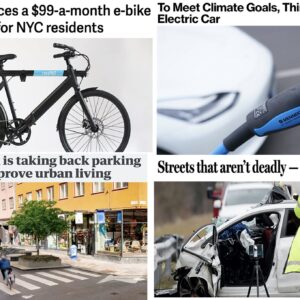
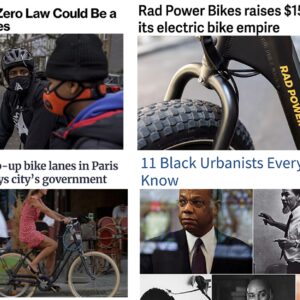
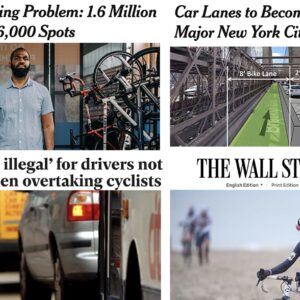
Thanks for reading.
BikePortland has served this community with independent community journalism since 2005. We rely on subscriptions from readers like you to survive. Your financial support is vital in keeping this valuable resource alive and well.
Please subscribe today to strengthen and expand our work.
I have to admit that I am starting to warm up to Mayor Pete. When he was in the primaries his background and foreign affairs policies gave me the feeling he was a cats paw for the CIA and military industrial complex. But now, he kind of reminds me of mayor Bud Clark ( who I liked).
All I know is if he can finagle enough funding from Amtrak Joe to build out high-speed rail from Portland (or Salem, Eugene, whatever) up to Vancouver BC, I’ll buy his drinks when he comes to town.
Oh, he’s definitely CIA. But at least he’s human. “Your quarrel is with my creator, sir,” is one of the greatest political combacks ever.
“used a People for Bikes grant to boost bicycling during the Covid pandemic”
Recreational cycling may have done well during the pandemic but it’s my impression that utilitarian cycling, and especially, commute cycling has decreased even more than would be expected based on the shift to work from home. This is, of course, anecdotal but major cycling commute routes are empty and the number of bikes parked at grocery stores has cratered — and especially so outside of inner PDX. Those who are counting on the apparent uptick in recreational cycling to translate to an increase in utilitarian cycling may be in for a surprise. (I hope I’m wrong.)
And just in case someone reads the above and thinks that I’m all about criticism without a theory of change, my position is that the missing ingredient in Portland’s active transportation activism is a political focus and a willingness to advocate for anti-automobile (anti-Fordist) demands. Appeasement of regressive politicians and the carrot has failed to work for generations — why would we expect either to suddenly start working now?
PS: From my perspective anti-Fordism means we should make it increasingly onerous and expensive for people who live in transportation-rich areas to drive while aggressively funding less toxic/costly alternatives for people who have no socioeconomic option other than driving.
From what I’ve seen in communities in the national 0.2% and lower mode split (the vast majority of US cities), there has been a definite and noticeable upswing in the use of bicycles for commutes and errands during the pandemic, as well as recreational use. Of course in Platinum cities like Portland, you’d hardly notice it, being up in the clouds in your (Groucho) Marxist utopian loftiness…
If you were in Portland you’d notice a clear decrease in certain times and places. On my 30 minute commute I used to be passed by 20-30 other bikers. At the low point it was actually 0 to 1, now it’s creeping back up to perhaps 5.
There’s a notable increase in ebikers as a proportion of all riders.
Bike parking on street racks downtown went to nothing in mid 2020, now it’s maybe 30 percent of 2019.
My numbers aren’t exact, there’s no spreadsheet, but the difference is so profound you’d hardly miss it.
I was thinking about this today as I used my bike to do a curbside pickup of groceries at Whole Foods–the employee was taken aback that I was on my bicycle. This is of course anecdotal, but it got me thinking how many curbside and drive-through things that have popped up in the last year are predominantly for cars, that we expect them to be for cars, and that people using other modes of transportation are excluded. And obviously, that comes from people, including political leaders, being comfortable with the status quo.
Who is going to vote for politicians who have a goal of making their life harder? The only way that will work is if there is a positive vision that makes the trade-off worthwhile. I.e. one of those carrots you dismiss.
The climate and biodiversity crisis is going to force very hard life choices. But I do agree with you that USAnian society is likely too broken to face adversity and make the kinds of sacrifices needed to mitigate harm.
Well, here is a good example of what I was talking about: we have a lot of dirty trucks driving around Portland. Diesel engines are very durable, and last decades. Also, local trucking uses the cheapest trucks available (i.e. the oldest and dirtiest hand-me-downs). What could cause a trucking company to invest in upgrading their fleets to electric?
Automation. While that will put a bunch of folks out of work, by doing so it will change the economics of shipping so much that it might make the investment worthwhile. I doubt many companies will be selling automated diesel trucks, so the automated fleet will be largely electric.
It may be less satisfying than inflicting punishment on polluters, but the carrot of automation will allow us to make much more rapid progress at curbing both local and global pollution.
Purely anecdotal but I used to pop into the grocery store most days after work on my short bike commute home as I contemplated what to make for dinner. Now I shop weekly by car to reduce COVID exposure.
I agree that transportation cycling has probably taken a hit, even as recreational cycling has increased enormously. I think a lot of that is around safety, both real and perceived. Despite carjackings having spiked out of control (and I’ve yet to hear of a cyclist getting jacked or robbed in the last few months), people still are shifting to cars out of fear of crime. And there’s the very real concern that driver behavior has become exponentially more reckless (or even outright malevolent) since the pandemic hit last year. I don’t have any solutions to these two problems, except to hope that crime and lawlessness come more under control as society reopens over the next year or two.
I share your hope, but wonder what forces will bring people back into compliance with the law. Lack of consequences often leads to lack of responsibility, especially for those who don’t follow a pro-social internal moral compass.
Yeah, I think Pete should be at least a “5” on a DC Capital bikeshare bike seat post vs. the 3? in the photo. 😉
Funny how quick cyclists are to criticize each other over seatpost height. It’s an odd little passive aggression, trying to “help” people with this particular “problem.”
I learned this firsthand many years ago, when I had a bad seatpost clamp on my bike. I couldn’t go five miles without it slipping down an inch or so. And I couldn’t go five more miles – at least in Portland – without someone commenting. Just keep it to yourselves, people: I could point out five things about your bike that I think are stupid, too. Don’t tempt me.
The SCOTUS case does not appear to be about ped safety at all. It’s related to the laws that many cities have passed that ban panhandling in medians. The cities argue the ban is 100% about safety, and not at all about limiting free speech or moving homeless people away from where drivers can see them. The case is about if there is a legitimate safety argument about banning peds from using the median.
I’ll be watching this one. One suburb here (Spring Lake Park) is debating just such a measure, claiming it’s a safety issue, which of course is BS.
It’s also about racism. In the Deep South after the Civil War, Southern cities would pass ordinances banning loitering and arrest anyone who was doing so. The arrested prisoners, mostly Blacks, were then sent as “chain gangs” (with ankle manacles) to work in factories to do hard labor, essentially slave labor, but perfectly legal. It’s too easy to see modern electronic ankle bracelets being used in exactly the same way, to do similar menial jobs for no wages, much like Oregon uses prisoner “volunteers” to clean roads and fight forest fires.
If I were locked away in prison (perhaps for over-commenting) and I had the opportunity to get out into the forest and fight fires, you bet I would jump at the opportunity.
OPB interviewed several firefighting prisoners last summer, and they said the same, and seemed to be getting a lot of good out of the program..
Comparing that to slavery is a bit of a reach.
Step 1: Create laws that criminalize non-violent offenses with multi-year prison stays (most drug laws)
Step 2: Enforce said laws in a racist pattern that results in higher per-capita imprisonment of people of color.
Step 3: Provide work programs that allow these prisoners to do the jobs that no one else is willing to do.
The 13th amendment exception for prison labor wasn’t an accident. It is inextricably linked to slavery.
There are plenty of people willing to be seasonal firefighters. Again, I’d refer you to reporting from OPB this summer.
This program is not slavery.
People who might never think about wildland firefighting, or maybe even know it’s a thing, find out about it in prison as a way to not be in a box and get ample nourishing food* while working with a team? Sounds sort of OK, except that prisoners don’t have much choice of productive activities and get paid peanuts. What if society decides that ALL firefighting will be done by prisoners? And that to fill the prisons we’ll just grab anybody who appears to have too much free time? (See you in prison)
Uber driving and NCAA football are also kind of edgy in the fair pay department but the victims don’t start the year looking at a row of 300 bologna sandwoches.
* https://www.nytimes.com/2021/03/02/opinion/prison-food-farming-health.html